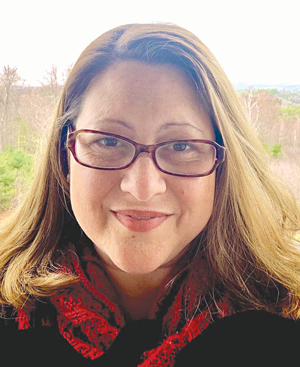Derry teacher earns sabbatical for Promoting Just Schools
The New Hampshire Charitable Foundation has awarded its 2020 Christa McAuliffe Sabbatical to Misty Crompton, a social studies teacher at West Running Brook Middle School in Derry. The sabbatical gives a New Hampshire teacher a year off with pay and a budget to work on a project focused on improving education in the state. Crompton discussed her project, Promoting Just Schools, and the need for educational equity.
What’s your background in education and equity work in schools?
I’m a Grade 7 social studies teacher in Derry. I’ve been a teacher there for 20 years. I’ve been on the executive board of my education association in Derry for over a decade. I belong to an organization called Leaders for Just Schools, and to a New Hampshire Human Civil Rights Committee. I also recently [became] an advisor with the nonprofit group Rise of Peace. I work with these organizations as well as my local school district right now in this equity work.
Why did you apply for the sabbatical?
It was the Just Schools program that really motivated and inspired me to [apply] for the sabbatical. … My heart was really invested in doing this work, but my realities made it difficult to dive in the way I wanted to. There are a lot of time commitments that come with my career, and I’m very busy with a million committees and clubs and volunteer organizations. … I’m also a mom of two active boys, an 11-year-old who has autism and an 8-year-old.
Why did you decide to focus your work on Just Schools and equity in schools?
I was asked to go to San Diego last summer for the Just Schools program. There were 100 educators there for four days, examining issues of equity and racial and social justice, and it was incredibly powerful and emotional. … So much fear and frustration had set in [because of] these huge divisions in our country right now, and we were all motivated by the fact that we didn’t want our students to feel hopeless about their future. … Education is complex and affects and influences many areas of our society. We have a great deal of power in education, and I feel like now is as good a time as ever to use our power as educators [to create] a more just and equitable society.
What’s on your sabbatical to-do list?
I’ll be working with my social studies department this summer … to examine the curriculum and see if there’s anything we can do to make it more inclusive, maybe a little less Eurocentric, and make sure we’re truly representing a diverse spectrum of people. … The pedagogy is important, but I think forming relationships with students and finding out [how] they feel … is a really simple and honest way to get started, so I’m also working with the Human Civil Rights Committee to collect student voices about whether or not they think school is a place where people are treated fairly and equally. … I’ll be working with my school and district [on] an opportunity audit … to make sure [our] schools are concerned with equity, growth and social justice and are really modeling that in their own policies and interactions. … [It’s] a really awesome opportunity to have meaningful conversations about … restorative practices, how we discipline students, how we view justice, and how we can better represent a diverse spectrum of people. … I’ll be working with educators, examining personal policy management and practices to help them better understand the impact of equity and bias, while learning it myself at the same time. … I’ll also be building a website and blog to guide educators to some specific resources … on how to examine equity in their field.
Why is this work something that’s needed now, and in New Hampshire?
We’re not exempt from this work. … We do have diversity in New Hampshire, and we definitely have some systemic issues that need to be examined. … We’ve seen things evolve with equity in special education over the years … but when it comes to certain other obstacles that are more socially related … there are still some issues of equity. … We have to show some commitment to change, to examine the status quo, and to admit some groups still have a vast amount of privilege over other groups. As difficult as this conversation can be, it’s an important one. … I feel like people are getting a little more serious about tackling that work right now. The conversation is ripe.
What sustainable changes do you hope to see in the school system after your sabbatical is over?
I would love to see a commitment to equity work become self-sustaining and contagious in society … and I want to push and swing the pendulum toward that as much as I can during the sabbatical. … For me, it’s not about any one specific [goal]; it’s about sparking a movement and getting back to reexamining priorities within our schools that have been shuffled aside over the years. … We can’t keep pretending schools are a place where you walk in, get your basic skills served up, take a standardized test and go home. I think we all know the realities of school and the impact it has on our lives and personal development is greater than that. … There are people in New Hampshire who would … feel a real sense of hope knowing educators are committed to understanding [what these] equity issues are … and my hope is teachers will take action, and students will really know and believe their schools are advocating for them.






